« The Washington Post : The branding genius of K-pop band BTS »
 Thursday, January 30, 2020 at 6:00AM |
Thursday, January 30, 2020 at 6:00AM |  DFSB Kollective
DFSB Kollective 
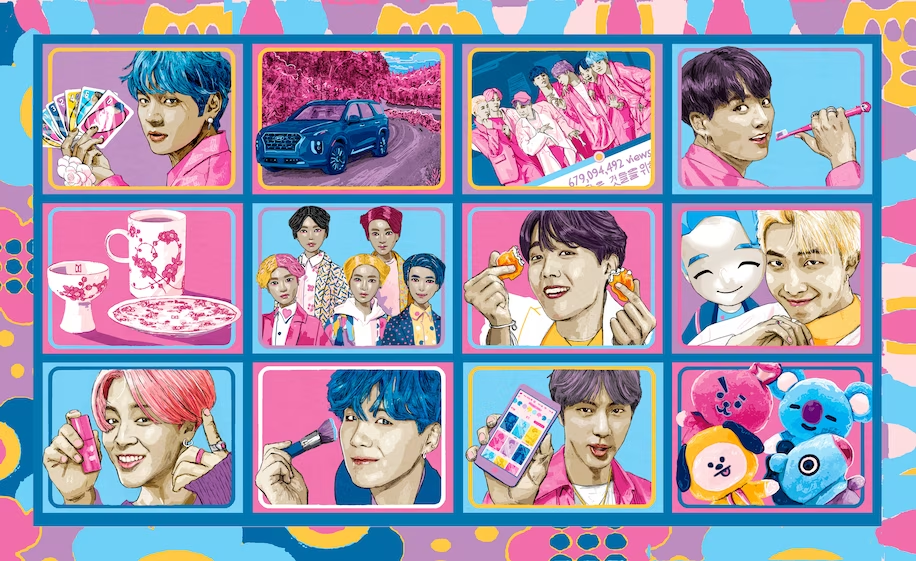 Matthew Brazier for The Washington Post What boy band BTS lacks in Grammys, they make up for with billions of dollars in sponsorships
Matthew Brazier for The Washington Post What boy band BTS lacks in Grammys, they make up for with billions of dollars in sponsorships
It is one of South Korea’s biggest exports — with ticket sales, music downloads and merchandise racking up a reported $4.65 billion last year, accounting for a sizable 0.3 percent slice of their country’s GDP.
BTS, or Beyond the Scene, a seven-member South Korean boy band, in 2019 became the first group since the Beatles to earn three No. 1 albums on the Billboard 200 chart in less than a year. But once again, the band didn’t get a single Grammy nomination, though it attended last week’s show and took the stage with Lil Nas X
Still, BTS has left its mark on the global music industry. “People will buy anything they touch,” said Paul Han, co-founder of the Korean pop news site Allkpop.com, which has 10 million monthly readers worldwide.
The band has built a merchandising and endorsement empire on a scale not seen in Western pop music — drawing on a commanding social media presence to reach millions of young, global consumers.
A new album, “Map of the Soul: 7,” is set to drop Feb. 21 and is predicted by Billboard to be one of the best-selling albums of the year. Preorders already exceed 4 million.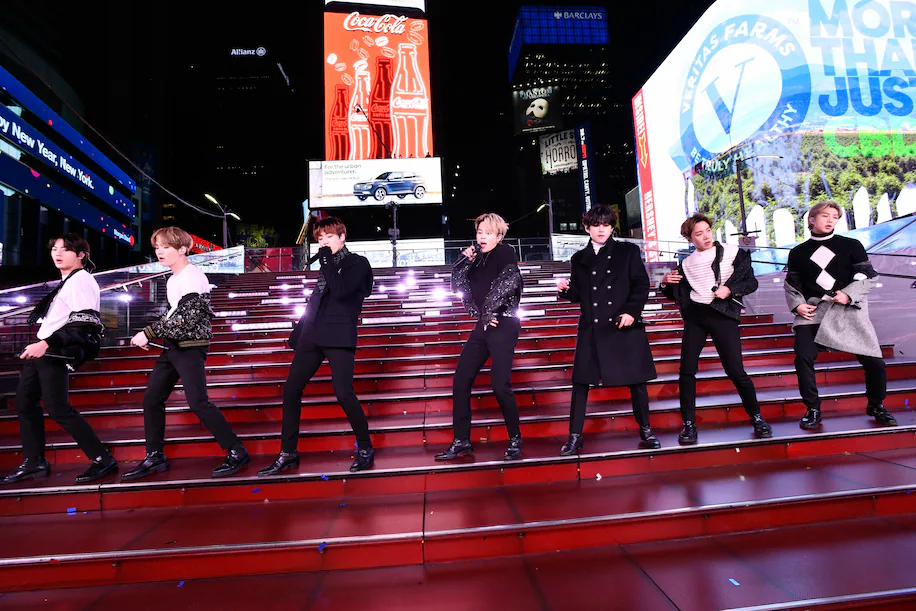 BTS performs during Dick Clark’s New Year’s Rockin’ Eve With Ryan Seacrest on Dec. 31, 2019, in New York City. (Eugene Gologursky/Getty Images/Dick Clark Productions) With BTS at the height of its popularity, the band could be at a turning point.
BTS performs during Dick Clark’s New Year’s Rockin’ Eve With Ryan Seacrest on Dec. 31, 2019, in New York City. (Eugene Gologursky/Getty Images/Dick Clark Productions) With BTS at the height of its popularity, the band could be at a turning point.
Its members — who range from 22 to 27 years old — must enlist for compulsory military service before they turn 28, in accordance with South Korean law, which could put their careers on hold for around two years, essentially taking them out in their prime.
“As a Korean, it’s natural, and someday, when duty calls, we’ll be ready to respond and do our best,” Kim Seok-jin, known as Jin, the oldest member at 27, said on CBS’s “Sunday Morning.”
For now, they are “enjoying the ride,” BTS leader Kim Nam-joon, or RM, said in the same interview.
With a mix of pop, hip-hop, R&B and electronica, BTS’s drawing power for its tours ranks with Taylor Swift, One Direction and Beyoncé. Like them, BTS was able to sell out London’s 90,000-capacity Wembley Stadium, except they did it in 90 minutes.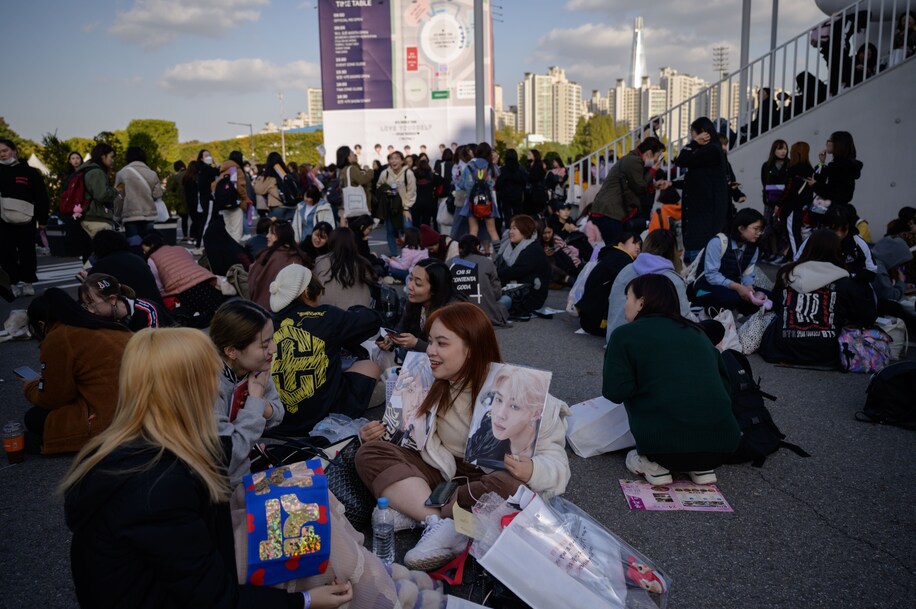 Fans arrive for the final show of the band’s world tour on Oct. 29 at Olympic Stadium in Seoul. (Ed Jones/AFP/Getty Images) Last year, the group’s tour crashed TicketMaster’s website, selling out 300,000 tickets in minutes, at an average price of $452.
Fans arrive for the final show of the band’s world tour on Oct. 29 at Olympic Stadium in Seoul. (Ed Jones/AFP/Getty Images) Last year, the group’s tour crashed TicketMaster’s website, selling out 300,000 tickets in minutes, at an average price of $452.
BTS has arguably been even more successful in building a merchandising and endorsement empire that extends far beyond typical tour T-shirts.
“They kind of reached the point where everything about them simply works, whether that’s merchandise, concerts, album singles or streaming,” said Youngdae Kim, a Korean Music Awards committee member and author of the book, “BTS The Review.” “I think it’s one of those rare moments for an artist’s career, where everything surrounding the artist simply works and makes money and more money.”
When BTS stepped out in a Hyundai Palisade last year, the SUV was on back-order for months. The band also launched lucrative partnerships with sportswear manufacturer Puma for track suits and sneakers; global character brand Line Friends for collectibles such as cellphone cases and plush dolls; South Korean beauty brands VT Cosmetics and Mediheal for makeup, perfume and face masks; and toy maker Mattel for figurines and an Uno card deck. Other collaborators, such as Starbucks and UNICEF, have said they plan to harness the band’s popularity to promote their humanitarian efforts.
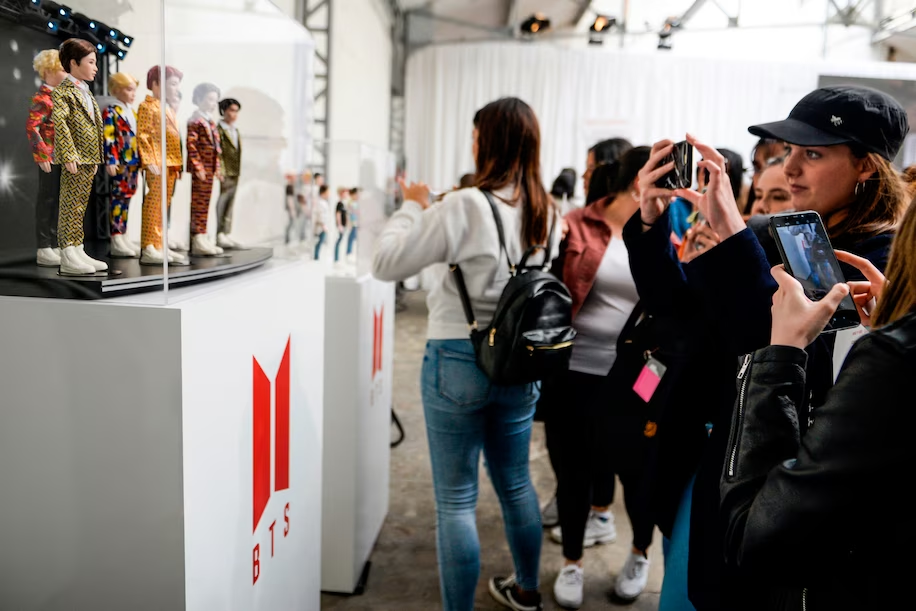 Visitors to a pop-up store in Paris take pictures of BTS merchandise last summer. (Aurore Mesenge/AFP/Getty Images) “What we love about BTS is that they are a pop culture music phenomenon that transcends age, culture and language,” said Lisa McKnight, the global head of Mattel’s Barbie brand. “We get a lot of input studying culture, looking at social media, looking at public response, media and earned media coverage, and then evaluate what would be a good collaboration … and we are fortunate to bring one of the most popular bands right now to life.”
Visitors to a pop-up store in Paris take pictures of BTS merchandise last summer. (Aurore Mesenge/AFP/Getty Images) “What we love about BTS is that they are a pop culture music phenomenon that transcends age, culture and language,” said Lisa McKnight, the global head of Mattel’s Barbie brand. “We get a lot of input studying culture, looking at social media, looking at public response, media and earned media coverage, and then evaluate what would be a good collaboration … and we are fortunate to bring one of the most popular bands right now to life.”Behind BTS’s success is its record label, Big Hit Entertainment, a privately held company with an estimated worth between $1.08 billion and $2.07 billion, according to the Hyundai Research Institute.
Composer Bang Si-hyuk, known as the “Hitman,” started Big Hit in 2005 after working at another top label, JYP. Way before Psy’s “Gangnam Style” was a worldwide hit in 2012, breaking 2 billion YouTube views, JYP was pushing K-pop to a crossover Western audience with Wonder Girls. The girl group was the first Korean act to chart, reaching 76 on the Billboard Hot 100 for “Nobody” in 2008 and opening for the Jonas Brothers in 2009.
“At the time that I started my company, physical album sales were abruptly going down and digital sales were not coming up to compensate,” Bang told Time magazine. “But K-pop idol groups had an advantage, in that they had many opportunities to diversify revenue streams and their fans were extremely passionate, allowing concerts to compensate for the dropped album sales.”
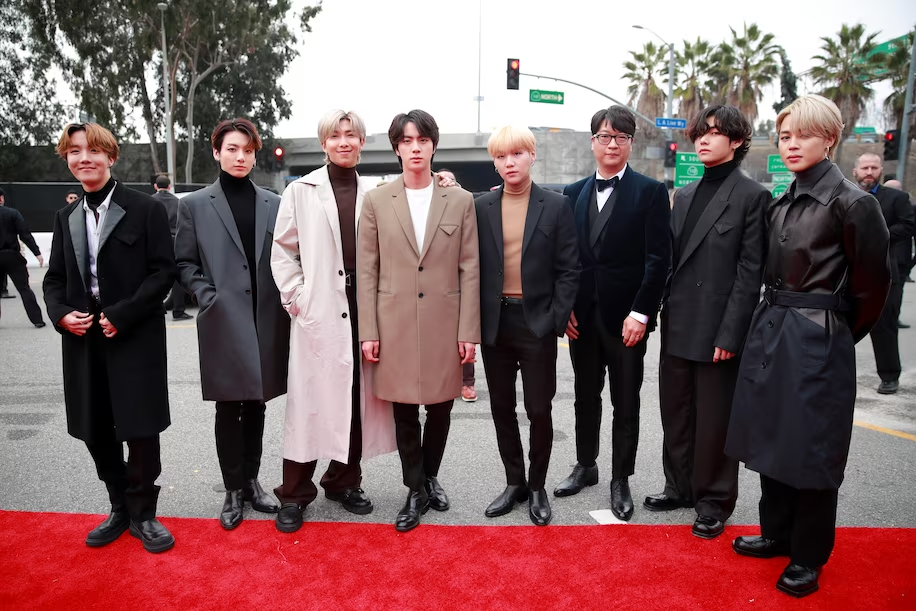 BTS and Lenzo Yoon, the chief executive of Big Hit Entertainment, third from right, attend the 62nd Annual Grammy Awards on Sunday in Los Angeles. (Rich Fury/Getty Images for the Recording Academy) Big Hit soon surpassed other major players in the industry, overtaking SM Entertainment, worth $1.3 billion, JYP at $788 million and YG at $492 million, according to Hyundai Research Institute.
BTS and Lenzo Yoon, the chief executive of Big Hit Entertainment, third from right, attend the 62nd Annual Grammy Awards on Sunday in Los Angeles. (Rich Fury/Getty Images for the Recording Academy) Big Hit soon surpassed other major players in the industry, overtaking SM Entertainment, worth $1.3 billion, JYP at $788 million and YG at $492 million, according to Hyundai Research Institute.
Bang assembled BTS through auditions: a boy band built like One Direction, the Backstreet Boys and ’N Sync. Many started as teens, hailing from all over South Korea. Underground rapper RM was signed first in 2010 and became the group’s leader. Then came another underground rapper, Min Yoon-gi (Suga), that same year; and later dancers Jung Ho-seok (J-Hope), Jeon Jung-kook (Jungkook), Park Ji-min (Jimin); plus singer Kim Tae-hyung (V) and actor Jin.
Jin is a graduate of Konkuk University’s Department of Film and Animation, where he majored in acting, and he is pursuing graduate studies at Hanyang Cyber University. The rest of the band attended Global Cyber University.
“We really started at the bottom. When we first started, no one paid attention to us,” RM said on CNN, adding that the group lived in the same house and learned to deal with each other like “brothers.” “We sometimes argue from time to time. We know how to deal with it and how to learn from each other. We have a very special bond.”
Other Korean labels have been known to impose strict control over their artists’ lives, going so far as to include no-dating clauses in their contracts. While this could prevent artists from acting out, it also puts pressure on them to strive for perfection, potentially exacerbating mental-health issues. The industry has come under scrutiny after the deaths of two K-pop stars last year. But for BTS, there seems to be more openness regarding music creation and social media, possibly from what Bang described as a “relatively liberal trainee system.”
Big Hit Entertainment said it sees its business that way, too.
“It is as important to be partners in philosophy as it is to create hit products and generate sales,” said Steve Sejung Ha, general manager of Big Hit IP. “Our most important customers are the ‘fans’ who love the artist, so it is very important to work with an open-minded partner who can actively understand and communicate with our fans. I believe this aspect has a huge impact on our performance.”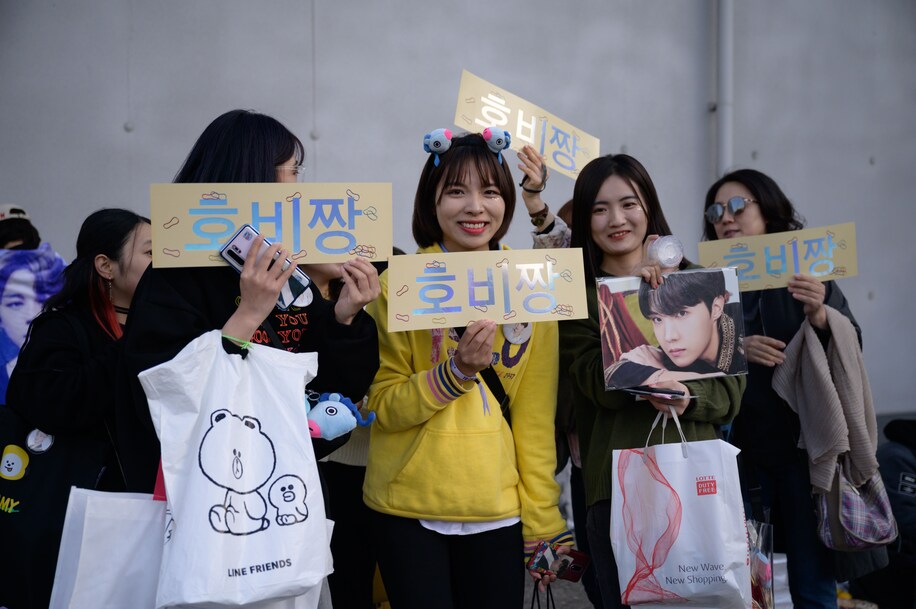 Fans arrive for the final show of the band’s world tour on Oct. 29 in Seoul. (Ed Jones/AFP/Getty Images)Some projects involve BTS directly, such as the collaboration with Line Friends, in which band members contributed drawings that inspired emoji that look like various things, such as a koala and a heart.
Fans arrive for the final show of the band’s world tour on Oct. 29 in Seoul. (Ed Jones/AFP/Getty Images)Some projects involve BTS directly, such as the collaboration with Line Friends, in which band members contributed drawings that inspired emoji that look like various things, such as a koala and a heart.
Others are inspired by BTS, including two lines of Mattel fashion dolls, one that is more realistic and one in a more animated style.
“We focus on offering new experiences rather than just products,” said Ha. “Essentially, BTS participates as the ‘muse,’ but the method of involvement varies by product.”
These products have been especially popular among fans; many are limited edition and tour-only merchandise. And with mandatory military service looming, BTS may have a limited timeline, which creates a “feeding frenzy,” said Steven Ekstract, brand director of the Global Licensing Group at Informa Markets, a worldwide licensing industry trade show organizer.
Their branding savvy is comparable to Kiss, the glam metal band considered a pioneer in music merchandising, said Ekstract. At its peak, Kiss sold more than 1,000 different products, racking up $2 million a year in the 1970s.
“They’re both very into the branding, much more so than I’d say 95 percent of what other groups and bands have done,” Ekstract said. “I think every band now today wants to do that … but I just think there are a few that really break out and separate themselves from the pack, and BTS certainly is at their height.”
Unlike earlier titans of the boy band craze, ’N Sync and the Backstreet Boys, BTS began in the era of social media. BTS’s fan base, known as its ARMY — which stands for Adorable Representative M.C. for Youth — has helped expand the band’s reach at a speed a 2000s tween would envy.
“Everything that happens to BTS comes down to the fan base and how dedicated we are,” said Roma Barade, an 18-year-old high school senior and administrator for the New Jersey fan group. “A lot of us look at them as serious role models. We look up to everything they do and buy products that they use.
This was certainly the case for the founder of BTS’s U.S. fan group, U.S. BTS ARMY, Imelda Ibarra, who has spent thousands of dollars on face masks, makeup, Uno cards and Puma shoes. She even broke her 10-year practice of vegetarianism for BTS-endorsed fried chicken when she was in South Korea in 2016 for one of their concerts.
With K-pop, fans are more than consumers: They are like a parent giving unconditional love and support to their child, the band, said David Kim, who runs the YouTube channel DKDKTV, which analyzes K-pop’s influence. And these “parents” have viral commercial power.
“Thousands of reviews on the product are uploaded via social media, which more consumers and brands can easily see,” said Kim, whose YouTube channel has more than 566,000 subscribers. “It’s a free second promotion and also a convenient way to keep track of marketing impact in terms of data tracking. ARMY is one of the biggest and most supportive communities in the world, so when you have ARMY backing you up, it’s really hard to lose.”
The band’s mobile game, “BTS World,” reached No. 1 in downloads in 33 countries within 14 hours of its launch last June, said Simon Sim, president of Netmarble U.S., the company that released the game.
It was the same for the Hyundai Palisade, which launched in South Korea in December 2018 and globally in 2019. The “SUV had basically no brand awareness,” said Sungwon Jee, vice president and head of the Creative Works group at Hyundai Motor Co.
BTS changed that, with a marketing and social media campaign that collected 800 million likes, comments and shares. Hyundai’s “Buy Palisade” tweet was mentioned 40 times more than for any of its previously launched models.
Beyond using social media power to sell products, BTS is promoting causes, too. The group campaigned for UNICEF to end violence against children and spoke at the U.N. General Assembly in 2018 about being true to oneself.
Their campaign raised $2.3 million and “helped young people open up about their own experiences of violence and bullying and encouraged love and kindness, online and offline,” said Gmin Seo, assistant manager for the corporate partnership and philanthropy team at UNICEF Korea.
As the band prepares to go on tour, and eventually into the military, members are unveiling a global art project promoting diversity, love and care, called Connect BTS, in London, Berlin, Buenos Aires, Seoul and New York. One installation is a hot-air balloon made of recycled plastic bags.
For fans like Ibarra, that message is more important than merchandise.
“It sucks, and I will absolutely miss them,” Ibarra said of their required military service. “It’s something they have to do and I’m ready for it, but what I always tell people, what is the amazing thing about BTS, that even if they’re not here, they left us with an amazing message that can continue on. … It’s timeless, to love yourself, speak for yourself and be true to who you are.”
Reporter : Marian Chia-Ming Liu
Featured Commentator : Bernie Cho [DFSB Kollective]
